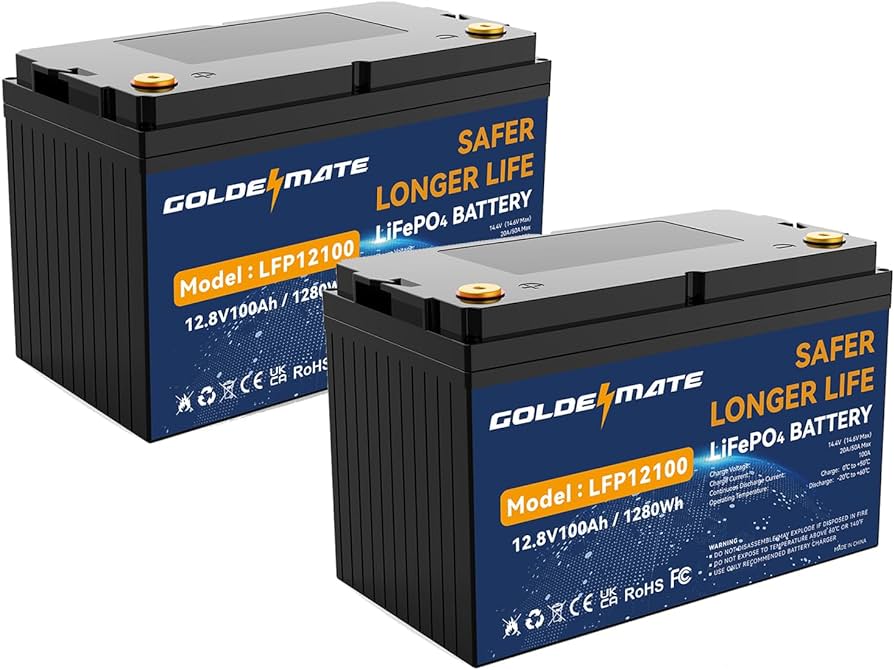Lithium boat batteries typically last between 5 to 10 years, depending on usage and maintenance. Boat owners understand the importance of a reliable battery to power their vessel’s electrical systems.
When it comes to boat batteries, lithium options have gained popularity due to their higher energy density, longer lifespan, and lighter weight compared to traditional lead-acid batteries. But how long do these lithium boat batteries actually last? In general, lithium boat batteries have a lifespan of 5 to 10 years.
However, this can vary based on factors such as usage frequency, charging and discharging cycles, and proper maintenance. We will delve into the factors that affect the lifespan of lithium boat batteries and provide tips on how to maximize their longevity.
What You Need To Know About Lithium Boat Batteries
Lithium boat batteries have become increasingly popular among boat owners due to their numerous advantages. These batteries offer a longer lifespan compared to traditional options, making them a worthwhile investment. A quick overview of lithium boat batteries reveals their lightweight construction, which is ideal for marine applications.
Additionally, they have a high energy density, ensuring efficient power delivery for extended periods. Another key advantage is their ability to hold a charge for longer periods when not in use, eliminating the need for constant recharging. Understanding the lifespan of lithium boat batteries is crucial, as it varies depending on factors such as usage, maintenance, and charging practices.
By following proper care and maintenance procedures, you can expect lithium boat batteries to last for many boating seasons, making them a reliable and efficient choice for marine power needs.
Factors That Affect The Lifespan Of Lithium Boat Batteries
The lifespan of lithium boat batteries is influenced by several factors. One crucial aspect is the number of charging and discharging cycles the battery goes through. The more cycles it undergoes, the shorter the overall lifespan will be. Another vital factor is the temperature and weather conditions the batteries are exposed to.
Extreme heat or cold can adversely affect their performance and longevity. Additionally, proper maintenance and care play a significant role in extending the lifespan of lithium boat batteries. Regularly cleaning the batteries, checking for any signs of damage, and following manufacturer guidelines for storage and usage can help maximize their durability.
By considering these factors and taking appropriate measures, boat owners can ensure that their lithium batteries last as long as possible.
Tips To Extend The Lifespan Of Lithium Boat Batteries
Lithium boat batteries have become popular due to their longer lifespan compared to traditional lead-acid batteries. To maximize the lifespan of these batteries, it is important to follow a few tips. First, avoid deep discharging the battery as it can significantly reduce its overall lifespan.
Optimal charging techniques are also crucial in maintaining the battery’s health. Ensure that you charge the battery fully, but do not overcharge it either. Additionally, it is important to follow proper storage and transportation guidelines. Store the battery in a cool and dry place, away from direct sunlight and extreme temperatures.
When transporting the battery, make sure it is properly secured to prevent any damage. By following these tips, you can extend the lifespan of your lithium boat batteries and get the most out of them during your boating adventures.
Signs Of Battery Degradation And When To Replace
Battery degradation is a common issue that affects the lifespan of lithium boat batteries. Various signs indicate degradation, such as reduced battery capacity and decreased performance. These batteries may not hold a charge for as long as they used to or take longer to charge fully.
Other indications include increased self-discharge rate and faster draining during use. It is crucial to monitor the battery’s condition regularly to determine whether it needs replacement. If the degradation is significant and impacting the battery’s overall performance, it may be time to consider getting a new one.
Understanding battery capacity degradation can help boat owners make informed decisions about when to replace their lithium batteries, ensuring optimal power supply for their marine activities.
Comparison Of Lithium Batteries With Other Battery Types
Lithium boat batteries have gained considerable popularity due to their longer lifespan compared to other battery types. When it comes to assessing the benefits of lithium batteries, they outshine lead-acid batteries, delivering superior performance and durability. With their lightweight design and high energy density, lithium batteries also outperform AGM batteries in terms of power output efficiency and cycle life.
These advanced batteries offer an extended service life, lasting significantly longer than traditional options. Additionally, they have a lower self-discharge rate, ensuring optimal performance even during long periods of inactivity. Moreover, lithium batteries boast faster charging times and are more resistant to voltage drops, offering a reliable power source for boat owners.
As lithium batteries continue to evolve, their long-lasting capabilities make them an excellent choice for marine applications.
Frequently Asked Questions About Lithium Boat Batteries
Lithium boat batteries can last for many years, making them a valuable investment. These batteries are compatible with various onboard devices, providing reliable power for your boating experience. When it comes to disposing of old lithium batteries, it’s important to follow proper recycling procedures to prevent any harm to the environment.
With their long lifespan and versatility, lithium batteries are worth considering for your boating needs. So, if you’re looking for a reliable and durable power source, investing in lithium boat batteries is a smart choice. They not only provide consistent performance but also offer peace of mind during your adventures on the water.
Upgrade to lithium batteries and enjoy worry-free boating!

Credit: www.nytimes.com
Frequently Asked Questions Of How Long Do Lithium Boat Batteries Last
How Long Do Lithium Boat Batteries Last On Average?
Lithium boat batteries typically last between 8-10 years, depending on factors such as usage, maintenance, and charging practices. With proper care, they can provide reliable power for your boat for a decade or more, making them a worthwhile investment for avid boaters.
What Advantages Do Lithium Boat Batteries Offer?
Lithium boat batteries offer several advantages over traditional lead-acid batteries. They are lighter, have a higher energy density, and provide consistent power output even as the charge depletes. Additionally, lithium batteries have a longer lifespan and shorter charging time, ensuring you spend more time on the water and less time charging.
Can I Use Lithium Batteries As A Replacement For Lead-Acid Batteries?
Yes, you can use lithium batteries as a replacement for lead-acid batteries in your boat. However, it is essential to ensure compatibility with your boat’s charging system and consult the manufacturer’s recommendations. Additionally, consider factors such as voltage requirements and space availability before making the switch.
Conclusion
The lifespan of lithium boat batteries can vary depending on various factors such as usage, maintenance, and charging practices. Generally, these high-performance batteries are designed to provide a longer lifespan compared to traditional lead-acid batteries. On average, a well-maintained lithium boat battery can last anywhere between 5 to 10 years.
However, it is important to note that the actual lifespan may differ based on specific circumstances. To extend the longevity of your lithium boat battery, it is crucial to follow a few maintenance tips. Regularly inspect the battery for signs of wear and tear, ensure proper charging and discharging practices, and keep the battery clean and dry.
Additionally, storing the battery in the recommended temperature range can help to preserve its lifespan. Investing in a high-quality lithium boat battery is a wise decision that can enhance your boating experience and provide long-lasting power. By understanding how to care for and maintain these batteries, boaters can maximize their lifespan and enjoy many seasons on the water without worrying about battery performance.




